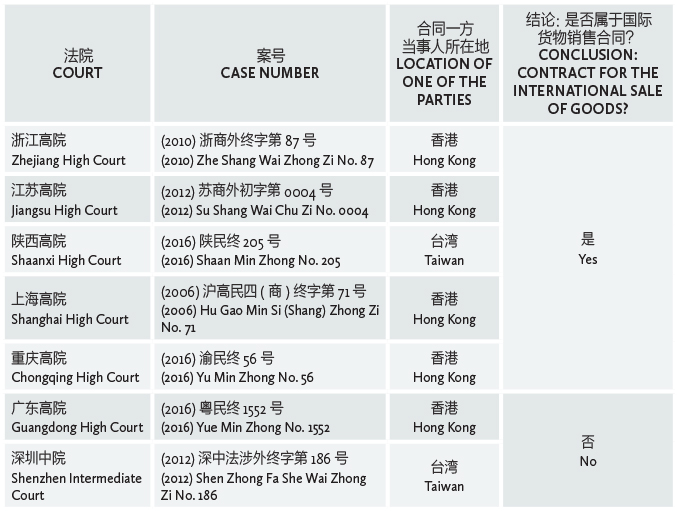In judicial practice, determinations have been inconsistent regarding whether a contract for the sale and purchase (S/P) of goods involving a Hong Kong, Macau or Taiwan enterprise (a sales contract) as one of the parties constitutes a contract for the international S/P of goods. If a sales contract is deemed a contract for the international S/P of goods (a ISP contract), then, pursuant to Article 129 of the Contract Law, the provision specifying a special four-year limitation of actions is applicable; otherwise the provision specifying an ordinary two-year limitation of actions applies (but it has become three years since the entry into effect of the General Provisions of the Civil Code on 1 October 2017). Where there is more than one court with jurisdiction over a sales contract dispute, and the two-year limitation of actions has expired but the four-year one is still in effect, the issue of selecting the venue most favourable to one’s side to conduct the procedure is of utmost importance.

BLAKE YANG
胡光律师事务所资深律师
Senior Associate
Martin Hu & Partners
We have collated the judgments of courts around the country, mainly high courts (see the table in this article). Among them, the Zhejiang High Court held that, pursuant to Articles 1 and 19 of the Interpretations of the Supreme People’s Court of Several Issues Concerning the Application of the PRC Law on the Application of Laws to Foreign-Related Civil Relationships (1), for the issue of the application of the law to civil relationships engendered by Hong Kong-related contracts, trials should refer to the foreign-related civil relationship, so it would not be inappropriate to apply the four-year limitation of actions to Hong Kong-related contracts in accordance with Article 129 of the Contract Law. The judgments of the Jiangsu, Shaanxi, Shanghai and Chongqing high courts directly found that the contracts in question were contracts for the international S/P of goods, but did not provide detailed reasoning. One should note that apart from one of the parties being a Hong Kong or Taiwan enterprise, there were no obvious foreign elements in those cases that were sufficient to determine the nature of the contract in question as “being a contract for the international sale of goods”.
In contrast, both the Guangdong High Court and the Shenzhen Intermediate Court found that the contracts in question were not contracts for the international S/P of goods, by proactively applying the United Nations Convention on Contracts for the International Sale of Goods (CISG). They held that pursuant to the CISG, the precondition for application of an ISP contract is that the contract for the sale of goods be concluded between parties whose places of business are in different countries, and “‘different countries’ means not falling under the sovereignty of one country, so a S/P contract concluded between parties whose places of business fall within the sovereignty of the same country is not an ISP Contract…” Since Hong Kong and Taiwan are parts of China, the contracts in question were not contracts for the international S/P of goods.
You must be a
subscribersubscribersubscribersubscriber
to read this content, please
subscribesubscribesubscribesubscribe
today.
For group subscribers, please click here to access.
Interested in group subscription? Please contact us.
你需要登录去解锁本文内容。欢迎注册账号。如果想阅读月刊所有文章,欢迎成为我们的订阅会员成为我们的订阅会员。
Blake Yang is a senior associate and Chancy Chen is an associate at Martin Hu & Partners






























